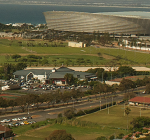The recently-concluded Atlantic Dialogues in Rabat, Morocco, brought together over 300 officials, policy-makers, businesspersons, opinion-makers and media representatives from countries around the Atlantic basin. Their goal was to chart out a new relationship amongst themselves at a time when Africa and the southern Atlantic are becoming increasingly central to global developments.
In marathon sessions from 28-30 September 2012, they discussed whether international cooperation could replace the laissez faire that presently prevails in Africa.
All the major economic forces in the world today – the U.S., the European Union (EU), BRICS and IBSA – have come together on the African continent in a new version of the ‘Great Game’ – originally a term for strategic rivalry amongst colonial powers. This new game aims to capture Africa’s mineral and hydrocarbon resources for growth at home, blur borders to gain advantages of scale on investment and infrastructure investments, and export ever-increasing goods and services for the burgeoning numbers of African youth.
The Southern Atlantic – countries on the western African seaboard and the eastern seaboard of Latin America – constitute some of the most dynamic growth centres in the world. The active presence of Asian players like China, India, Japan and Korea is an indication of the growing attraction of the resources of this region. There was recognition at the recent conclave, not unmixed, of China’s relentless economic strides in Africa to support its hungry economy, and an acknowledgment that Brazil had also strongly increased its profile on the continent in the recent past.
India’s historical consciousness of the Southern Atlantic, dating from Mahatma Gandhi’s struggle in South Africa, and its recent private sector investments and concessional credit lines to finance infrastructure projects, marks the presence of one more emerging global power on the continent.
The interest shown by China, Brazil and India allows Africa to move away from its traditional “donor-recipient” relations with the West. But the internecine competition between all these countries for Africa’s primary resources will ultimately harm Africa.
The commodity boom in Africa has assured high rates of growth, although the gains have been cornered by the political and economic elite, fuelling cronyism and rampant corruption. More importantly, the terms of exchange remain the same and the gainers are primarily extra-African. The entrenchment of the major economic powers on the African continent may be a way to realise Africa’s potential to meet its own needs, as well as those of the world economy. But this will happen only if, in their enlightened self-interest, the economic power groups agree to ensure that the benefits go to intra-African players, and, above all, to the multiplying African population. Otherwise, this positive conjuncture in Africa is likely to be frittered away.
There are good reasons for channelling the benefits. Africa has the potential to meet major global challenges: feeding a world of soon-to-be nine billion people; tackling the challenges of global warming and climate change, and reducing religious and ethnic conflicts.
However, Africa’s own equally serious challenges need to be addressed to make this happen. The vexed issues of failed and failing governance in Somalia, the Democratic Republic of Congo, Nigeria and Mali, and religious and ethnic strife are nullifying the modest gains of the improving economic situation. The presence of radical Islamist groups from Libya in northern Mali has violently disrupted a local syncretic version of Islam. In Nigeria, which has Africa’s largest population, violence by radical groups, allegedly allied with Al Qaeda, does not bode well for the peaceful development of that country.
Similarly, despite the plethora of pan-African, inter-regional and sub-regional organisations, there is an acute sense of frustration at the outcome of their efforts in ameliorating the living conditions of the ordinary African.
At a time when every major economic and strategic player is forging a path to an African door, Africa must use this opportunity to get the major economic groupings to jointly implement a ‘Green Agenda’ for the continent.
This agenda can emphasise three “green” dimensions: focus on a pan-African agricultural revolution using the experiences of India and Brazil, and the research into new seeds, plant genetics, fertilisers and irrigation systems available from the U.S. the EU, India and others; set up in situ climate-friendly manufacturing, production and extraction technologies to meet the needs of the growing African market and the world economy; and showcase the continued prevalence of syncretic Islam and religious harmony in most of sub-Saharan Africa.
This three-fold agenda will leverage, for the benefit of Africans, the comparative advantage of Atlantic as well as Asian players to implement norms on best practices in agronomy and agriculture, climate-friendly manufacturing and extractive technologies, integrative research in industrial, bio-technology and chemical applications, communication and information, services, and in social sectors like education and health.
A ‘Green Agenda’ could utilise available state-of-the-art technologies to enhance food security, reduce the effects of climate change by ab initio, at the outset, putting in low-emission technologies in manufacturing, real estate and mining, and best practices in health and education. Together, this will build a climate of cultural inclusiveness.
Collaborative action across a broad front is the need of the hour in Africa, and this should be the focus of the new Great Game.
Ambassador Rajendra Abhyankar, a former Indian diplomat, is Chairman, Kunzru Centre for Defence Studies and Research, Pune.
This article was exclusively written for Gateway House: Indian Council on Global Relations. You can read more exclusive content here.
For interview requests with the author, or for permission to republish, please contact outreach@gatewayhouse.in.
© Copyright 2012 Gateway House: Indian Council on Global Relations. All rights reserved. Any unauthorized copying or reproduction is strictly prohibited.


